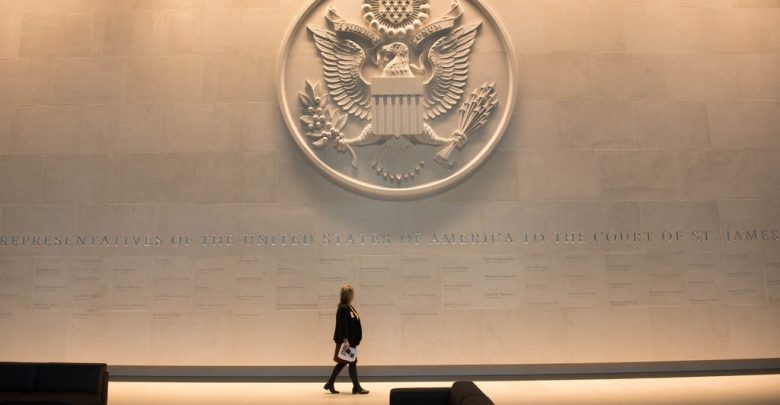
Learn about the new US procedures for visa applicants
تعرف على الإجراءات الأمريكية الجديدة لطالبي تأشيرات الدخول
Visa applicants to the United States are required to submit any information about social media accounts they have used in the past five years under a State Department policy that started on Friday.
Such account information would give the government access to photos, locations, dates of birth, dates of milestones and other personal data commonly shared on social media.
“We already request certain contact information, travel history, family member information, and previous addresses from all visa applicants,” the State Department said in a statement. “We are constantly working to find mechanisms to improve our screening processes to protect U.S. citizens, while supporting legitimate travel to the United States.”
In March 2017, President Trump asked the secretary of state, the attorney general, the secretary of homeland security and the director of national intelligence to put in effect “a uniform baseline for screening and vetting standards and procedures,” according to a memo published in the Federal Register. Requiring information about the social media accounts of visa applicants was part of that.
The move represents a step up from a September 2017 measure in which the Homeland Security Department proposed and enacted a regulation calling for the surveillance of social media use of all immigrants, including naturalized citizens. During the Obama administration, the State Department began to ask visa applicants to voluntarily submit their social media information.
“This seems to be part and parcel of the same effort to have an extraordinary broad surveillance of citizens and noncitizens,” Elora Mukherjee, director of the Immigrants’ Rights Clinic at Columbia Law School, said on Sunday of the latest development. “Given the scope of the surveillance efforts, it is hard to find a rational basis for the broad surveillance the Department of State and the Department of Homeland Security have been doing for almost two years.”
The added requirement could dissuade visa applicants, who may see it as a psychological barrier to enter the United States.
“This is a dangerous and problematic proposal, which does nothing to protect security concerns but raises significant privacy concerns and First Amendment issues for citizens and immigrants,” Hina Shamsi, the director of the American Civil Liberties Union’s National Security Project, said on Sunday. “Research shows that this kind of monitoring has chilling effects, meaning that people are less likely to speak freely and connect with each other in online communities that are now essential to modern life.”
The social media web today is a map of our contacts, associations, habits and preferences. This kind of requirement will result in suspicion of surveillance of travelers and their networks of friends, families and business associates, Ms. Shamsi said, adding that the government had failed to explain how it would use this information.
Further, the government has been unable to prove that social media can provide reliable indications that identify a security threat, she said.
“In the absence of any such indicators, what we’ve seen domestically and abroad is government officials penalizing people’s speech, religious affiliation and other conduct,” she said.
source: nytimes.com
بدأت وزارة الخارجية الأمريكية بإلزام طالبي تأشيرات الدخول إلى الولايات المتحدة بالكشف عن حساباتهم على مواقع التواصل الاجتماعي، مع استثناء الزيارات الرسمية والدبلوماسية.
ووفقا لما ذكرته وكالة “أسوشييد ربس”، فقد قالت الوزارة في بيان لها، إنها بدأت في إلزام المتقدمين لطلب تأشيرات الدخول بالكشف عن “اسم المستخدم” الخاص بهم في مواقع التواصل الاجتماعي، وجميع حسابات البريد الإلكتروني، إضافة إلى أرقام الهواتف.
وقالت الوزارة إن ذلك يرجع إلى ضرورات “الأمن القومي”، في إشارة إلى أي مخاطر أمنية قد تنتج عن دخول أشخاص إلى الولايات المتحدة.
وبعد أن اقترحت السلطات هذه الإجراءات الجديدة العام الماضي، قدرت أنها ستؤثر على نحو 14.7 مليون شخص سنويا.
وسيتعين على الأشخاص المسافرين إلى الولايات المتحدة للعمل أو الدراسة تقديم معلوماتهم.
وقالت الوزارة: “إننا نعمل باستمرار على إيجاد آليات لتحسين عمليات التدقيق لحماية المواطنين الأمريكيين، بينما ندعم السفر المشروع إلى الولايات المتحدة”.
وفي السابق، كان يتعين فقط على المتقدمين الذين يحتاجون إلى تدقيق إضافي، مثل الأشخاص الذين زاروا أجزاء من العالم تسيطر عليها الجماعات الإرهابية، تقديم هذه البيانات.
ولكن سيتعين على المتقدمين الآن تقديم أسماء حساباتهم في قائمة منصات التواصل الاجتماعي المعروفة، وكذلك التطوع بتقديم تفاصيل حساباتهم على أي مواقع غير مدرجة.
ووفقا لصحيفة “ذا هيل”، فإن أي شخص يكذب أو يقدم معلومات غير صحيحة عن استخدامه لوسائل التواصل الاجتماعي قد يواجه “عواقب وخيمة متعلقة بالهجرة”.



